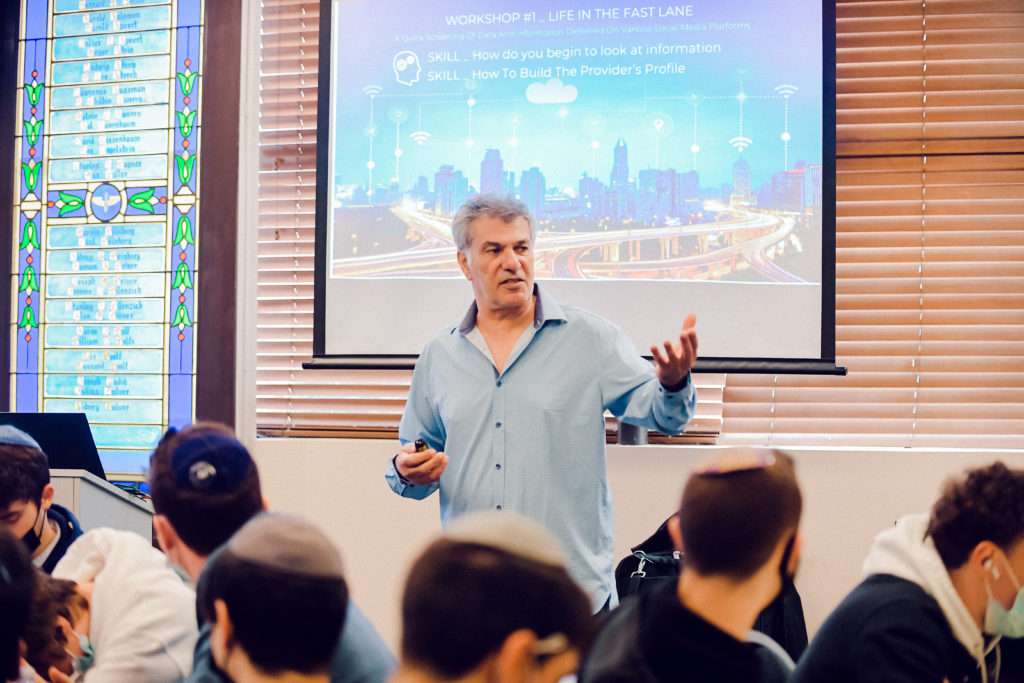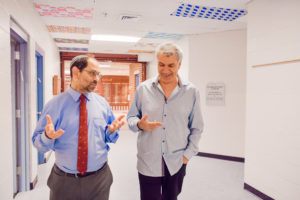

These days, navigating the college scene as a first-year university student takes more than an acceptance letter and a campus map. It takes analytical thinking skills and the practiced ability to discern what’s true and what isn’t on social media. Especially when it comes to discussions about Israel and its relationships in the Middle East.
So last month, Beth Tfiloh Dahan Community School, with funding from The Associated: Jewish Federation of Baltimore, sponsored a new kind of college preparation course for its graduating seniors. Sixty-five 12th graders, many of whom are expecting to enter university in the next year, attended the crash course taught by Israeli intelligence expert and educator, Avi Melamed. Over a four-day period, students were taught the nuts and bolts of intelligence analysis: how to use it to scrutinize misinformation and disinformation they might hear about Israel, and how to separate propaganda from fact on social media websites.
But even more importantly, Melamed said, it was designed to equip students with the tools to help them conduct reasoned fact-based discussions, something that is often a challenge in emotionally charged settings like an anti-Israel presentation or a student-led boycott, divestment and sanctions rally.
“The program aims to connect the students with the tools and skills for critical thinking and what we call the ‘critical thinking instinct,’” Melamed said.
That “instinct” starts with an informed understanding about Israel’s geopolitical existence in the Middle East.
Melamed’s course also teaches the students how to analyze the information they are exposed to on Twitter, Facebook and other websites and evaluate their accuracy.
The course isn’t about cognitive learning and memorization, Melamed said. “It’s about the students working and practicing the tools and the skills they are provided with during the program. [The] students are practicing real-life situations regarding social media, which is of course a very significant component of our everyday life.”

Zipora Schorr, Beth Tfiloh Dahan Community School’s director of education, said the critical thinking skills that the students learn will have an important role in the years to come.
“[These] seniors are going to be on a college campus very soon. In a few months, they are going to be confronting serious … anti-Israel rhetoric,” Schorr explained, noting that such encounters can be very impactful to students who are looking to fit in to a new social network. “And we believe that information and education are the ways to prepare our children for not just college but for the future.”
Neil Rubin, who chairs Beth Tfiloh’s Jewish history department, said the program’s structure also gave students the opportunity to debate and discuss differing viewpoints in a nonpartisan atmosphere.
“We are not a monolithic school of thought,” Rubin said. “We have [students who are] right, left, center and everywhere between. So there were some really good conversations taking place … And that was the goal — to replicate what happens in Israeli intelligence circles when you have people sitting around and debating what is really there, what’s really not there and then what do you do about it.”

Building community dialogue
Beth Tfiloh Dahan Community School isn’t the only organization that is exploring ways to bridge communication when it comes to rhetoric and diverse opinions about Israel. The Associated is as well.
Melamed’s high school seminars are part of a larger program he and his wife Maia Hoffman run called Inside the Middle East, which offers seminars on the Middle East through an apolitical lens. Melamed developed the concept for ITME while serving as the Salisbury Fellow of Intelligence and Middle East Affairs for the Eisenhower Institute. He is also the primary author of two books under the same-named series. The most recent, “Inside the Middle East: Entering a New Era,” by Melamed and Hoffman, was released last month.
Israel’s often complex relationships and role in the Middle East are an enigma for Western thinkers who aren’t fluent in Hebrew or Arabic and don’t have access to real-time information, explained Melamed.
“There is a very acute need among Western audiences for a cohesive, in-depth education about the Middle East [and] a deep and acute need for encouraging and inspiring critical thinking tools and mindsets,” he said.
Melamed isn’t alone in his assessment. The ITME program has gained increasing attention in recent years from schools, Jewish federations and community organizations in the U.S. and Canada that are looking for ways to bridge knowledge gaps in their communities. In 2020, the program attracted the interest of The Associated for inclusion in its Insight Israel Forum, which provides venues for apolitical, nonpartisan education about Israel.
The Associated President Marc Terrill said that ITME filled a niche that the forum was looking for at the time.
“It was clear to Associated leadership that there was limited understanding of the facts, the context, complexities and nuances connected to the Israel story,” he said. “The Insight Israel Forum sought to up the level of Israel Education from ‘did not know that’ to graduate school level. And, concurrently, provide a forum for people to grapple with the facts and crystallize their own opinions.”
In this case, The Associated was looking for a way to bring together business leaders with diverse backgrounds in an interactive, in-person venue to discuss topics related to Israel. Personal Opinion Dialogue Seminars, or PODS, gave business leaders the opportunity to learn from experts like Melamed and engage in discussions about Israel. The point of the exercises was to explore consensus amid differing viewpoints and opinions.
“The PODS have been a real game changer in our quest for educated discussion about Israel and its future,” Terrill said.
Insight Israel Forum Co-Chair William Minkin said the PODS illustrated that fact-based information led to better dialogue and consensus, even among groups with divergent opinions. “I think that the lesson [we learned from the PODS is] while we may not all see eye-to-eye on different [aspects] of Israel, we can all appreciate the fact that we should have the same baseline of factual information to launch our discussions from,” he said.
Unfortunately, like many public programs, the Insight Israel Forum was forced to transition its services online after the pandemic started. But that also meant the forum was now able to open the webinar to more Baltimore viewers. Within months, the attendance began to grow.
In recognition of the program’s new virtual venue, Melamed renamed the presentation series the “Briefing Room” and broke the sessions up into scheduled presentations, each featuring a deep analysis of one Middle East region. Each 90-minute session is paired with an interview of a regional expert who can talk on the geopolitical issues at hand. The Briefing Room has hosted diverse topics ranging from the history and current status of Lebanon or the political challenges in Sudan, to the Abraham Accords and its complex status in the Middle East.
Jeffrey Blavatt, Insight Israel Forum’s executive director, said the goal of the webinar continues to be to engage discussion among community leadership. Melamed’s program not only encourages better media literacy, he said, but provides opportunities for leaders to exchange ideas and “learn from each other.”
“My guiding theme is that in order to understand Israel, you have to understand the Middle East,” Melamed said. “Israel’s strategic horizons, Israel’s challenges and prospects, are at the end of the day very much impacted by developments, plans and events in the Middle East.”
Beth Goldsmith, who serves as The Associated’s chair, said the program’s in-depth approach resonates with its viewers.
“I believe what appeals to everyone is Avi’s method. He gives us what feels like an insider’s view because most of the time it is,” she said.
In her view, his fluency in Arabic and Hebrew and his nuancedview as an independent intelligence analyst lends a unique authenticity to each presentation.
She said The Associated’s decision to create a forum that explores ways of breaking communication barriers and finding commonality through fact-based dialogue was “groundbreaking. I believe we were the first [in the Federation movement] to have anything like it.”
“Avi Melamed’s scholarly approach to the facts surrounding the Israel story, coupled with his deep understanding of the people, history and customs of all in the region distinguishes his work,” Terrill said. “All these factors have an apparent and subterrain impact on all that is going on today in Israel and the region.”
And, Terrill said, they carry a broader message: the power of the discerning audience.
“Avi also encourages you to be a sophisticated ‘consumer’ of media,” Terrill said. Whether it’s hearsay embedded in a Twitter feed, a poster at a campus presentation or a news blitz, “you have a responsibility to gather information from varied sources,” and “to make sure that they are reliable sources.” In this era of minute-by-minute news breaks, “[understanding] the biases and the context of the reporting,” added Terrill, is critical to understanding Israel’s true story and its relevance in the Middle East.







